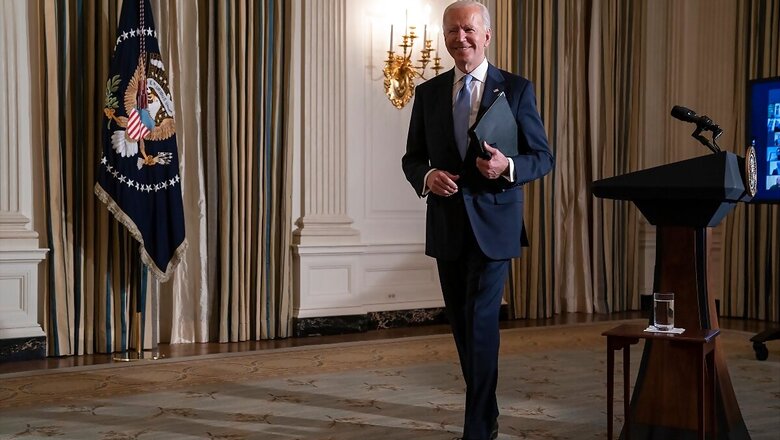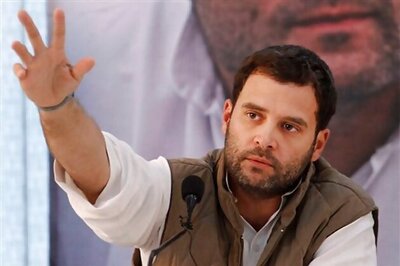
views
On Wednesday, January 20, a little before noon, Joseph R Biden was sworn in as the 46th President of the United States (POTUS) at the US Capitol in Washington DC amidst a heavy presence of armed security personnel. The fact that the presidential baton was handed over a few minutes before the constitutionally mandated time (12 noon on January 20) perhaps symbolised the urgency with which the USA wanted to drop the curtain on the turbulent and tainted Trump tenure.
There was a palpable sigh of relief both in the USA and the world at large that the transition of power in a bitterly contested White House election was peaceful and event free. This sense of relief was not misplaced, for it was only two weeks earlier – on January 6 – that the same venue, where the swearing-in took place, was stormed by supporters of Donald Trump who were encouraged by their ‘leader’ to go down the path of vandalism and violence.
This angry pro-Trump group with its vast support base across the USA had threatened to disrupt the January 20 swearing-in and hence the thin attendance at the Wednesday ceremony, where it was reported that more than 25,000 security personnel were deployed. The Covid pandemic also contributed to the constraints on the number of invitees – but the Biden swearing-in was also scarred by the graceless act of the outgoing POTUS, Donald Trump, refusing to be present at the ceremony.
A defiant Trump, without a protective Covid mask, boarding the helicopter to make his final exit from the White House, symbolised the reckless irresponsibility with which the US had been governed for the last four years. The post-Trump debris and toxicity that needs to be cleaned up is daunting and the Biden team will have its hands full from day one. But the healing process and a return to some degree of decorum, decency and normative democratic rhythms was evidenced in the Biden inaugural speech where he resolved to defeat white supremacy and domestic terrorism and called for an end to an ‘uncivil war’ that had convulsed the USA in recent years.
Political history was also made when Senator Kamala Harris was sworn in as the first woman Vice President of the USA a little before the Biden assumption of office. The fact that she is also the first woman of African and Indian origin to be elevated to this high office in the United States is a case of many glass ceilings being broken and a victory for the celebration of racial diversity and gender that is integral to a robust democracy in the 21st century.
The Trump years were visibly insensitive to both race and gender and this is only part of his tainted legacy that the Biden-Harris team will have to redress. The spectrum of the governance challenges for the new team are complex and multi-layered, beginning with the domestic political polarisation that the Trump constituency had stoked.
The Obama years, when Biden was the Vice President, saw the beginning of a deep alienation and anger in one section of US society that felt marginalised and neglected against the backdrop of globalisation and domestic discontent. Some of the elements that exacerbated the socio-political mood were shrinking employment opportunities and the related rejection of the immigrant and the citizen of colour by a sullen and impoverished white majority.
This has grown to an impressive voter turnout of 74 million US citizens who did not vote for Joe Biden – many of whom do not support the January 6 desecration of the Capitol Hill. Biden, a consummate politician, became one of the youngest senators in US politics in December 1972 when he had just turned 30, and is considered to be the master of finding consensus in intense political discord.
This trait will be put to test as he leads a divided nation and his call to unity in his inaugural speech hit the right notes. Urging his fellow citizens to shed hatred and intolerance, Biden’s words have a resonance for the democratic temperament globally. He noted: “Politics doesn’t have to be a raging fire destroying everything in its path. Every disagreement doesn’t have to be a cause for total war. And we must reject the culture in which facts themselves are manipulated and even manufactured.”
Politics apart, public health is in disarray in the USA due to the Covid pandemic and the Trump oscillation about the gravity of the virus. On January 20, as the new President was assuming office, the USA had a Covid death toll of over 415,000 and the total number infected was set to cross the 25-million mark. Biden has promised 100 million vaccinations in the first 100 days of his presidency and this will become a critical metric of his leadership.
Economic, foreign policy, security and strategic challenges loom large and the estimated US $40 trillion deficit will constrain big-ticket Biden initiatives. China will remain an abiding challenge-cum-threat to US interests and the manner in which the Trump administration had packed the troubled bilateral relationship with policy tweaks in relation to Tibet and Taiwan in the last few weeks of its term will have to be astutely reviewed by team Biden.
But to his credit, President Biden brings considerable familiarity about the intricate subtext of the Beltway with him and his list of senior officials is encouraging. The White House will hopefully return to more familiar rhythms and there will be greater predictability in how the USA conducts itself and its engagement with many external interlocutors.
(The author is Director, Society for Policy Studies, New Delhi. Views expressed are personal.)
Read all the Latest News, Breaking News and Coronavirus News here


















Comments
0 comment